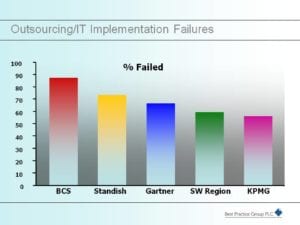A report has been published by the Institute of Government stating that Government ICT is an “outdated model”.
The problem with comments like this, is that the Government has a view that the majority of Private Sector ICT projects (in fact, their view is that all major projects including construction, outsourcing and so forth) pretty much all work to budget and are fit for their intended purpose.
 We do a good proportion of public sector and private sector work, advising various organisations on how to build relationships and align their contractual roles and obligations with their outsourcing and ICT service providers. Having undertaken more than 500 major projects, I can assure you our experience is that, on the whole, some parts of the public sector are generally better than the private sector at major projects. Specifically, most local authorities we have worked with tend to have a far better handle in managing large ICT projects than both central government and many parts of the private sector.
We do a good proportion of public sector and private sector work, advising various organisations on how to build relationships and align their contractual roles and obligations with their outsourcing and ICT service providers. Having undertaken more than 500 major projects, I can assure you our experience is that, on the whole, some parts of the public sector are generally better than the private sector at major projects. Specifically, most local authorities we have worked with tend to have a far better handle in managing large ICT projects than both central government and many parts of the private sector.
Where I think many areas of public sector, and in particular, local authorities struggle in major projects is in the service commissioning and outsourcing arenas. Even local authorities that have many years of experience in outsourcing/service commissioning find that when they renew or extend, the levels of service don’t improve, costs continue to escalate and the services are a lower standard of fitness for purpose than when the authority was dealing with the service internally.
Moving back onto the report. The think tank has called for the public sector to consider the approaches it has for ICT based projects. It warns that many millions and billions of pounds could be wasted. Its advice is basically that Agile type processes should be implemented to build systems on a piece by piece basis.
Some commentators imply that the government has followed an approach to ICT projects that assumes predicability. I wouldn’t disagree with this. Although specifications are drawn up in advance, in our experience, they are often output led rather than business objectives led. Often, those objectives don’t necessarily align with the corporate objectives. Unfortunately, solutions are then procured and delivery is managed against a pre-determined timetable. However, the management is against a project that doesn’t align with the corporate objectives and so doesn’t achieve the expectations of the organisation.
Part of the report cites the discontinuation of the huge £12 Billion NHS National Programme for IT. It also cites the £5 Billion National Identity Scheme. In these statements, the report seeks to prove that political priorities move quickly and uses this as a reason to suggest how difficult it is to predict how technology would develop over the course of a large project’s lifespan.
Why are they trying to predict this in the first place? If they worked to corporate outcomes and aligned these with operational objectives, the success of their projects would increase in a manifold fashion. Using Agile based methodologies will only work once the first step of corporate outcomes and operational objectives are aligned in the first instance. If you don’t do this, then using Agile will not help improve the project’s outcomes. You’ll simply be giving your service provider a blank chequebook.
You can download the Government Report here.
